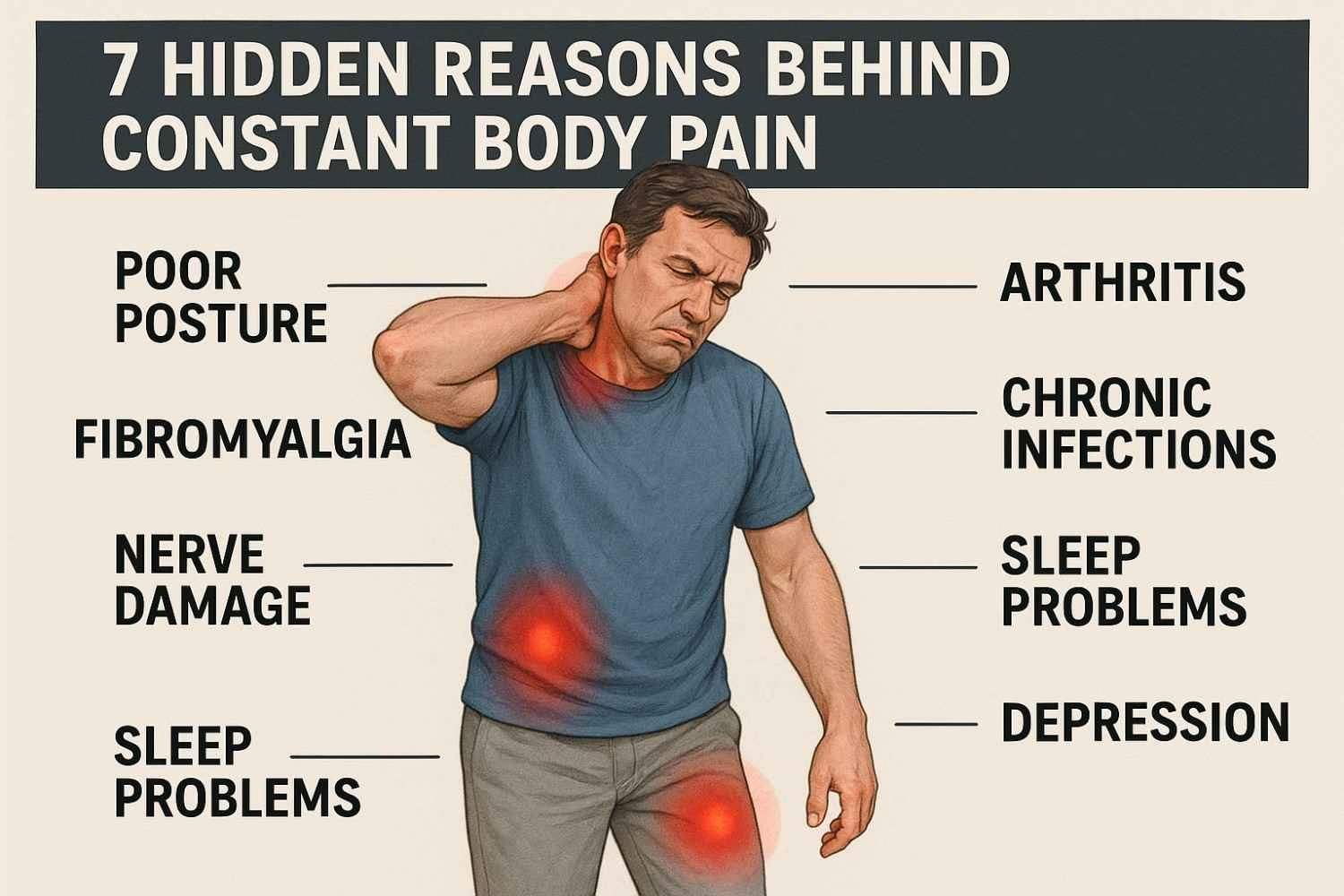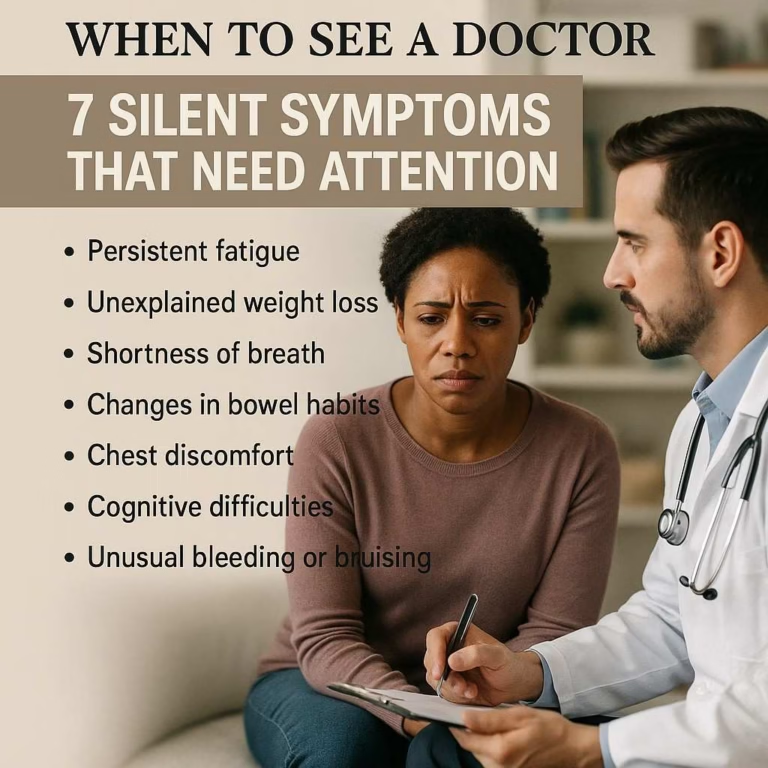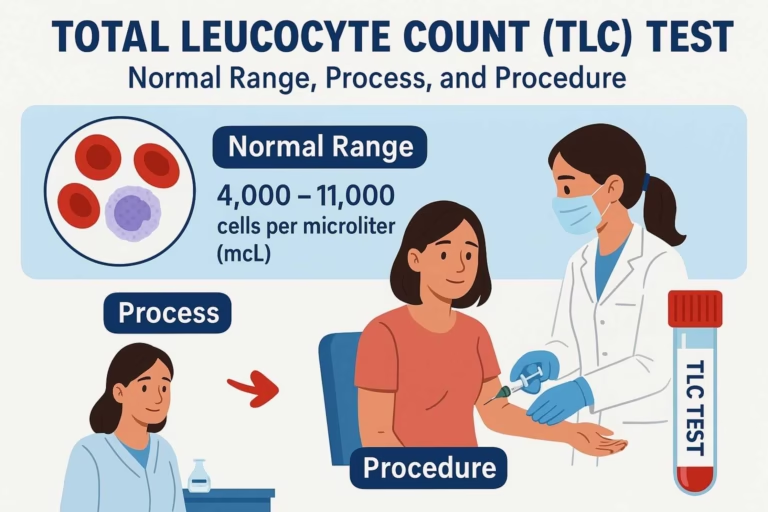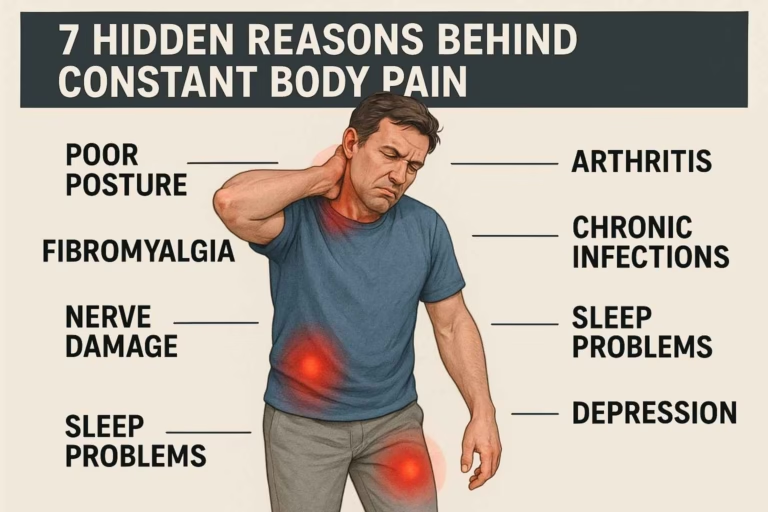
Introduction
Constant body pain can feel like an unwelcome companion, quietly draining your energy, changing your mood, and limiting your productivity. While occasional aches are common, persistent body pain usually indicates something more serious. Unknown underlying causes, such as lifestyle habits and nutritional deficiencies, may be quietly contributing to your discomfort.
Here, we will discuss the top seven hidden causes of body pain that you should be aware of and pay attention to.
1. Stress
Stress is a major cause of chronic physical conditions. When you are under constant stress, whether from work, finances, or personal issues, your body produces stress hormones such as cortisol and adrenaline, which can impair your immune system and cause muscle tension, headaches, and fatigue.
How Stress Causes Body Pain
- Chronic stress causes inflammation in muscles and joints.
- It weakens your immune system, making you prone to infections. Stress leads to poor posture, muscle stiffness, and tension headaches.
What are other signs of stress?
- Irregular or high heart rate
- Increased blood pressure
- Cold sweats or hot flashes
- Rapid breathing (hyperventilation)
- Frequent headaches or migraines
How to get relief from stress-related pain:
- Practice daily meditation or mindfulness breathing for 10–15 minutes.
- Avoid stressful environments whenever possible.
- Try relaxation techniques such as yoga or progressive muscle relaxation before bed.
- Maintain a balanced sleep schedule and engage in light physical activity.
2. Dehydration
Water is the foundation of life and essential for nearly every bodily function—from digestion and detoxification to maintaining electrolyte balance. Even mild dehydration can lead to muscle cramps, fatigue, and chronic body pain.
What are dehydration symptoms?
- Dizziness or light-headedness
- Dark-colored urine
- Dry mouth and fatigue
- Excessive thirst
Why dehydration causes pain:
When your body doesn’t get enough fluids, muscles and tissues lose flexibility, leading to stiffness, cramps, and joint pain. It also reduces blood circulation and oxygen supply to your cells, causing fatigue and soreness.
How to stay hydrated:
- Drink at least 8–10 glasses (4–5 liters) of water daily.
- Include hydrating foods like cucumber, watermelon, and coconut water.
- If suffering from diarrhea or heat exhaustion, use ORS (oral rehydration solution) to restore electrolytes.
3. Lack of Sleep
Quality sleep is essential for healing, hormone regulation, and cell repair. If you consistently sleep less than 6-7 hours per night, your body will fail to recover from daily stress, resulting in muscle soreness, fatigue, and cognitive issues.
Signs you’re not getting enough sleep:
- Difficulty concentrating or remembering things
- Trouble speaking clearly or forming thoughts
- Feeling disoriented or confused
- Constant irritability or mood swings
Why poor sleep causes pain
During deep sleep, your body releases growth hormones that repair muscles and tissues. Poor sleep disrupts this process, resulting in chronic fatigue syndrome and muscle pain.
Tips to improve sleep quality:
- Go to bed and wake up at the same time every day.
- Avoid caffeine or heavy meals before bedtime.
- Try guided meditation or soothing music to calm your mind.
- Keep your bedroom cool, dark, and quiet.
4. Anemia
Anemia occurs when your body’s red blood cells (RBCs) are insufficient or do not function properly. RBCs transport oxygen throughout your body, and when oxygen levels drop, you may feel fatigued, weak, and sore all over.
Symptoms of anemia include:
- Rapid or irregular heartbeat
- Dizziness and fatigue
- Chest pain or shortness of breath
- Cold hands and feet
- Pale or yellowish skin
Common causes of anemia:
- Iron deficiency
- Vitamin B12 deficiency
- Chronic diseases that affect RBC production
Treatment and prevention:
- Eat iron-rich foods such as spinach, lentils, and red meat.
- Take vitamin B12 supplements if prescribed.
- In severe cases, consult your doctor for further evaluation and treatment.
5. Vitamin D Deficiency
Vitamin D is necessary for calcium absorption, muscle function, and strong bones. A deficiency can cause hypocalcemia (low calcium levels in the blood), resulting in muscle pain, bone aches, and fatigue.
Symptoms of vitamin D deficiency:
- Muscle cramps and spasms
- Bone or back pain
- Tingling or numbness in the hands and feet
- Feeling tired or depressed
How to boost vitamin D naturally:
- Get 15–20 minutes of sunlight exposure daily.
- Include foods rich in vitamin D, like fish, egg yolks, and fortified milk.
- Take vitamin D supplements if recommended by a healthcare professional.
6. Chronic Fatigue Syndrome (CFS)
Chronic Fatigue Syndrome is a long-term condition marked by extreme fatigue and muscle pain that does not improve with rest. The exact cause is unknown, but it could be due to viral infections, immune dysfunction, or hormonal imbalances.
Common symptoms of chronic fatigue syndrome
- Consistent fatigue despite adequate sleep.
- Muscle and joint pain
- Sore throat or tender lymph nodes
- Frequent headaches
- Difficulty concentrating
How to Manage Chronic Fatigue NaturallyFollow a consistent sleep routine
- Do light physical activity or stretching
- Include a balanced diet rich in proteins, whole grains, and vegetables
- Avoid caffeine and alcohol
- Consult your doctor if symptoms persist beyond six months
7. Arthritis
Arthritis is inflammation of the joints that causes pain, swelling, and stiffness. There are over 100 different types of arthritis, but the most common are osteoarthritis and rheumatoid arthritis (RA).
Causes of arthritis:
- Aging and joint wear (osteoarthritis).
- Autoimmune conditions where the immune system attacks joint tissues (Lupus, Rheumatoid Arthritis).
- Joint infection or injury.
Symptoms of arthritis:
- Joint stiffness and reduced flexibility
- Redness and swelling around the joints
- Difficulty moving affected areas
If symptoms last for more than two weeks, consult a rheumatologist for diagnosis and treatment. Early management can prevent further joint damage and improve quality of life.
Conclusion
Chronic body pain should not be ignored. While minor pain from fatigue or exertion is normal, continuous or unexplained pain may indicate underlying health problems. Common causes include stress, dehydration, lack of sleep, anemia, vitamin D deficiency, chronic fatigue, and arthritis. A healthy lifestyle, which includes a balanced diet, adequate hydration, rest, regular exercise, and stress management, can help reduce pain. If the discomfort lasts for several days, seek medical attention for an accurate diagnosis and treatment.
Frequently Asked Questions (FAQs)
What should I do if I have constant body pain?
Begin by addressing common causes of constant body pain, such as stress, dehydration, or inadequate sleep. If the pain lasts more than two weeks, see your doctor to rule out arthritis or anemia.
When should I be concerned about physical pain?
If pain interferes with your daily activities, causes fatigue, or does not improve with rest, you should seek medical attention.
What are the main causes of body pain?
Common causes include stress, fatigue, dehydration, nutritional deficiencies, and chronic illnesses such as arthritis.
How can I get rid of body pain naturally?
Stay hydrated, eat a nutrient-dense diet, get 7-8 hours of sleep every day, meditate, and stretch frequently.
Is body pain a sign of illness?
Yes, sometimes body pain can be a sign of underlying health issues such as anemia, vitamin D deficiency, or arthritis. Consult a doctor if you are experiencing persistent pain.
Discover more from The Vigyan Chronicles
Subscribe to get the latest posts sent to your email.



